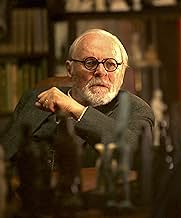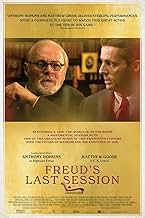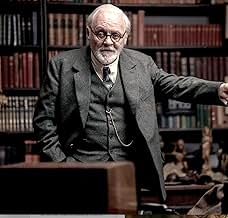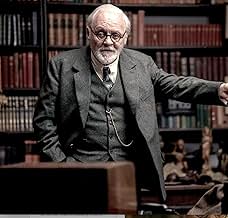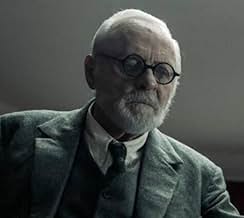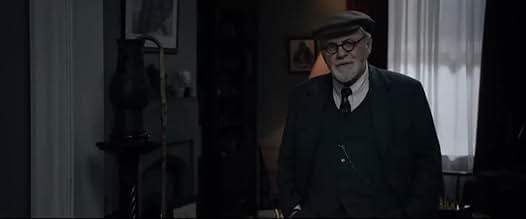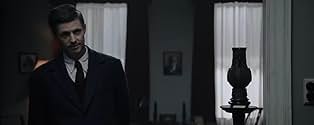CALIFICACIÓN DE IMDb
6.1/10
7.1 k
TU CALIFICACIÓN
En la historia de la película, Freud invita al emblemático escritor C.S. Lewis a debatir sobre la existencia de Dios. Y la relación poco convencional de Lewis con la madre de su mejor amigo.En la historia de la película, Freud invita al emblemático escritor C.S. Lewis a debatir sobre la existencia de Dios. Y la relación poco convencional de Lewis con la madre de su mejor amigo.En la historia de la película, Freud invita al emblemático escritor C.S. Lewis a debatir sobre la existencia de Dios. Y la relación poco convencional de Lewis con la madre de su mejor amigo.
- Dirección
- Guionistas
- Elenco
- Premios
- 1 nominación en total
George Andrew-Clarke
- Paddy Moore
- (as George Clarke)
Anna Amalie Blomeyer
- Ilsa
- (as Anna Blomeyer)
Opiniones destacadas
It's a contrast-intellectual-perspectives-on-God drama set on September 3, 1939, in London, England at the home of 83-year-old Sigmund Freud (Anthony Hopkins), and his daughter, Anna (Liv Lisa Fries). The Freuds had fled Vienna, Austria in 1938 after Anna had been briefly detained. Freud was severely suffering from oral cancer and taking a lot of morphine at the date in question. Freud did not believe in God, despite early training in both Catholicism and Judaism.
Freud's last intellectual visitor in this fictional account is C. S. Lewis (Matthew Goode), a 45-year-old Oxford don, and Christian apologist after rediscovering faith in the early 1930s.
The film follows the conversation between Freud and Lewis, with various flashbacks at key including Freud's youth and Lewis's experiences in World War I. The film also touches on Anna's relationship to her father and to Dorothy Burlingham (Jodi Balfour), a former patient of Sigmund's and close friend of Anna. The film also notes Lewis's conversion and his unusual relationship with Janie Moore (Orla Brady), the mother of Lewis's wartime comrade, Paddy Moore (George Andrew-Clarke).
"Freud's Last Session" has Freud and Lewis punch holes in their opponent's perspectives on God, with neither landing a knock-out. The flashbacks and inserts related to Anna provide some breaks. Hopkins and Goode are excellent while burdened with what felt like a pretty flat script. It was a kind of gamesmanship without much direction.
Freud's last intellectual visitor in this fictional account is C. S. Lewis (Matthew Goode), a 45-year-old Oxford don, and Christian apologist after rediscovering faith in the early 1930s.
The film follows the conversation between Freud and Lewis, with various flashbacks at key including Freud's youth and Lewis's experiences in World War I. The film also touches on Anna's relationship to her father and to Dorothy Burlingham (Jodi Balfour), a former patient of Sigmund's and close friend of Anna. The film also notes Lewis's conversion and his unusual relationship with Janie Moore (Orla Brady), the mother of Lewis's wartime comrade, Paddy Moore (George Andrew-Clarke).
"Freud's Last Session" has Freud and Lewis punch holes in their opponent's perspectives on God, with neither landing a knock-out. The flashbacks and inserts related to Anna provide some breaks. Hopkins and Goode are excellent while burdened with what felt like a pretty flat script. It was a kind of gamesmanship without much direction.
"Freud's Last Session" comes as a huge disappointment for me. This fictionalized encounter between groundbreaking pyschoanalyst Sigmund Freud
(Anthony Hopkins) and writer C. S. Lewis (Matthew Goode), on the early days of World War II with the first German bombers coming to England, doesn't
challenge viewers in asking themselves about what they're trying to figure out while challenging themselves about the nature of man and if God exists
or not (Freud is an atheist; Lewis is a Christian believer).
Adapted from Matt Brown's play, the material is poorly translated to the screen which doesn't allow a solid 15 minutes with both of those characters alone in their session without coming back and forth between some background moments from each character, or either some present situations with the threats of bombing or Freud's poor health that needs constant care from his daughter, of which we have some tense revelations about her relationship with her dominating father. And they tried so hard to make it a plot twist when it comes about that character and her secretary that it was annoying - specially if you know that while Freud didn't condemn homosexuality as a moral issue, he didn't want them near him (read Paul Roazen's works on him).
One sort of expects this being a psychoanalysis session rather than a weird chatting between famous authors with opposite views. For the life of me, as it wasn't a session in fact, I still don't have a clue on what Lewis was doing there. The verbal duels are the moments we wait for, there are so many interesting bits and exchanges between them but as a whole it all falls flat because either the dialogue is not that brilliant; the editing makes it all look like a tennis match - there's not a single moment for some monologue or some plan sequence; and the constant sidetrack of past moments that tries to build some character, or show some background but it's all disengaging and tedious.
A film that works with such ideals and challenges about mankind, God, faith and human relations while opposed or favorable to all that must have some coherence between action and dialogues, to create something that we in the audience might have question ourselves or haven't thought about. It must create some excitment even if those issues aren't all that thrilling (to some) and stay in the "boring" play format without distractions. If there's a play and film adaptation that translated such sentiment in a brilliant way was "The Sunset Limited", with Samuel L. Jackson and Tommy Lee Jones. Simple through actions as it stays in a small apartment room and the brilliance from the complex dialogues becomes a fascinating and mindblowing experience. Hopkins and Goode don't share the same dynamic despite being good performers. The excessive use of humor and the many interruptions in their digressions didn't help, and we perceive them as bitter figures that don't reach any enlightning conclusion.
Here's a film that crushed any previous and possible good expectations that I could have about presenting a challenging duel of opposed views from great minds of the 20th century, starring two favorite actors of mine. Its flawed and distractive presentation left me emptied out and waiting for more. Sadly, it delivered so little that either Freud and Lewis still became mysteries to me, and only their works or books about them will solve a little such mystery. I'd rather see Freud's first session, instead. 5/10.
Adapted from Matt Brown's play, the material is poorly translated to the screen which doesn't allow a solid 15 minutes with both of those characters alone in their session without coming back and forth between some background moments from each character, or either some present situations with the threats of bombing or Freud's poor health that needs constant care from his daughter, of which we have some tense revelations about her relationship with her dominating father. And they tried so hard to make it a plot twist when it comes about that character and her secretary that it was annoying - specially if you know that while Freud didn't condemn homosexuality as a moral issue, he didn't want them near him (read Paul Roazen's works on him).
One sort of expects this being a psychoanalysis session rather than a weird chatting between famous authors with opposite views. For the life of me, as it wasn't a session in fact, I still don't have a clue on what Lewis was doing there. The verbal duels are the moments we wait for, there are so many interesting bits and exchanges between them but as a whole it all falls flat because either the dialogue is not that brilliant; the editing makes it all look like a tennis match - there's not a single moment for some monologue or some plan sequence; and the constant sidetrack of past moments that tries to build some character, or show some background but it's all disengaging and tedious.
A film that works with such ideals and challenges about mankind, God, faith and human relations while opposed or favorable to all that must have some coherence between action and dialogues, to create something that we in the audience might have question ourselves or haven't thought about. It must create some excitment even if those issues aren't all that thrilling (to some) and stay in the "boring" play format without distractions. If there's a play and film adaptation that translated such sentiment in a brilliant way was "The Sunset Limited", with Samuel L. Jackson and Tommy Lee Jones. Simple through actions as it stays in a small apartment room and the brilliance from the complex dialogues becomes a fascinating and mindblowing experience. Hopkins and Goode don't share the same dynamic despite being good performers. The excessive use of humor and the many interruptions in their digressions didn't help, and we perceive them as bitter figures that don't reach any enlightning conclusion.
Here's a film that crushed any previous and possible good expectations that I could have about presenting a challenging duel of opposed views from great minds of the 20th century, starring two favorite actors of mine. Its flawed and distractive presentation left me emptied out and waiting for more. Sadly, it delivered so little that either Freud and Lewis still became mysteries to me, and only their works or books about them will solve a little such mystery. I'd rather see Freud's first session, instead. 5/10.
Strictly evaluated as an opening-to-closing credits endeavor, Freud's Last Session isn't a terrific film (probably more like 6-stars). But director/writer Matt Brown's effort features enough interesting philosophical nuggets-bolstered by one terrific acting performance-to be enjoyable for those who may sit down to watch it.
For a very basic overview, Freud's Last Session imagines a fictional encounter-which may or may not have actually occurred-between the titular psychoanalyst (Anthony Hopkins) and Christian apologist C. S. Lewis (Matthew Goode). As the two trade philosophical worldviews in Freud's home, the doctor's daughter Anna (Liv Lisa Fries) struggles with her own relationship with her famous father alongside a closeted relationship with colleague Dorothy Burlingham (Jodi Balfour).
I'm not entirely sure if Freud's Last Session has ever been produced as a stage play, but if so that might actually be the better format for it. With the core of the film being an intellectual sparring match between two academics, it's a bit of an odd fit for a big-screen format or presentation. Brown tries to flesh things out with the Freud daughter plotline and various flashbacks, but those avenues feel a bit forced and ultimately serve to take the focus off the "main event".
Fortunately, the movie has two things squarely in its corner: First, the back-and-forth repartee truly does raise some food for thought (if treading somewhat familiar religion vs atheism ground). A few lines really stuck with me. Secondly, Hopkins continues to provide transformative performances. Fans of his won't regret the admission just based on his turn alone here.
Overall, I settled on 7/10 stars for Freud's Last Session. Technically it isn't even "that good" of a flick, but the Hopkins performance and general setup are enough that those even nominally interested in the premise can find enough to enjoy.
For a very basic overview, Freud's Last Session imagines a fictional encounter-which may or may not have actually occurred-between the titular psychoanalyst (Anthony Hopkins) and Christian apologist C. S. Lewis (Matthew Goode). As the two trade philosophical worldviews in Freud's home, the doctor's daughter Anna (Liv Lisa Fries) struggles with her own relationship with her famous father alongside a closeted relationship with colleague Dorothy Burlingham (Jodi Balfour).
I'm not entirely sure if Freud's Last Session has ever been produced as a stage play, but if so that might actually be the better format for it. With the core of the film being an intellectual sparring match between two academics, it's a bit of an odd fit for a big-screen format or presentation. Brown tries to flesh things out with the Freud daughter plotline and various flashbacks, but those avenues feel a bit forced and ultimately serve to take the focus off the "main event".
Fortunately, the movie has two things squarely in its corner: First, the back-and-forth repartee truly does raise some food for thought (if treading somewhat familiar religion vs atheism ground). A few lines really stuck with me. Secondly, Hopkins continues to provide transformative performances. Fans of his won't regret the admission just based on his turn alone here.
Overall, I settled on 7/10 stars for Freud's Last Session. Technically it isn't even "that good" of a flick, but the Hopkins performance and general setup are enough that those even nominally interested in the premise can find enough to enjoy.
As a fan of Lewis' work (though far from being an expert on the guy) I was very interested in seeing this film. Even though the target audience is probably 30 years my senior, I still enjoyed it quite a bit. Hopkins's and Goode's performances really carry the film. Normally, I struggle with movies that use a lot of flashbacks to tell the story but it was done here in such a way as was helpful and not distracting or disorienting.
I do wish the script had been a bit stronger. There were a couple scenes that seemed to fizzle out rather than having a much needed emphatic response, mostly on Lewis's end.
Overall I liked the film and would see it again.
I do wish the script had been a bit stronger. There were a couple scenes that seemed to fizzle out rather than having a much needed emphatic response, mostly on Lewis's end.
Overall I liked the film and would see it again.
There is a recent outbreak of films made for people past puberty and this film is one of them. Serious issues are discussed. Thoughts are provoked. Both actors (and the actresses who get less flamboyant screen time) play intelligent philosophers grappling with something we all have to face - is there an eternity? Or oblivion? What prompts a genocide by humans to eliminate theirnown species? No flying cars or superheros, just intelligent adults grappling with serious questions.
Anthony Hopkins fills his unpleasant character with a minimum of scenery chewing, and Matthew Goode was a pleasant surprise, keeping his more quiet character in the mental battle. But the little known story of Anna Freud is tragic and brings real emotion to the story. A grown up film (sorry, Barbie).
Anthony Hopkins fills his unpleasant character with a minimum of scenery chewing, and Matthew Goode was a pleasant surprise, keeping his more quiet character in the mental battle. But the little known story of Anna Freud is tragic and brings real emotion to the story. A grown up film (sorry, Barbie).
¿Sabías que…?
- TriviaAnthony Hopkins had previously portrayed C.S. Lewis in Shadowlands (1993) 30 years prior to this film.
- ErroresLewis refers to JRR Tolkien as "John". He was known as "Ronald" to his friends.
- Citas
J.R.R. Tolkien: Jack, when you read myths about gods that come to Earth and sacrifice themselves, their stories move you, so long as you read it anywhere but the Bible.
- ConexionesFeatured in The 7PM Project: Episode dated 19 April 2024 (2024)
- Bandas sonorasVariations on an Original Theme, Op. 36, 'Enigma' Variation 9: Nimrod
Composed by Edward Elgar
Performed by Symfonický orchester Slovenského rozhlasu (as Slovak Radio Symphony Orchestra) & Adrian Leaper (Conductor)
Licensed courtesy of Naxos Music UK Ltd
Selecciones populares
Inicia sesión para calificar y agrega a la lista de videos para obtener recomendaciones personalizadas
- How long is Freud's Last Session?Con tecnología de Alexa
Detalles
- Fecha de lanzamiento
- Países de origen
- Idiomas
- También se conoce como
- Freud's Last Session
- Locaciones de filmación
- Productoras
- Ver más créditos de la compañía en IMDbPro
Taquilla
- Total en EE. UU. y Canadá
- USD 906,283
- Fin de semana de estreno en EE. UU. y Canadá
- USD 45,590
- 24 dic 2023
- Total a nivel mundial
- USD 4,190,596
- Tiempo de ejecución1 hora 50 minutos
- Color
Contribuir a esta página
Sugiere una edición o agrega el contenido que falta






